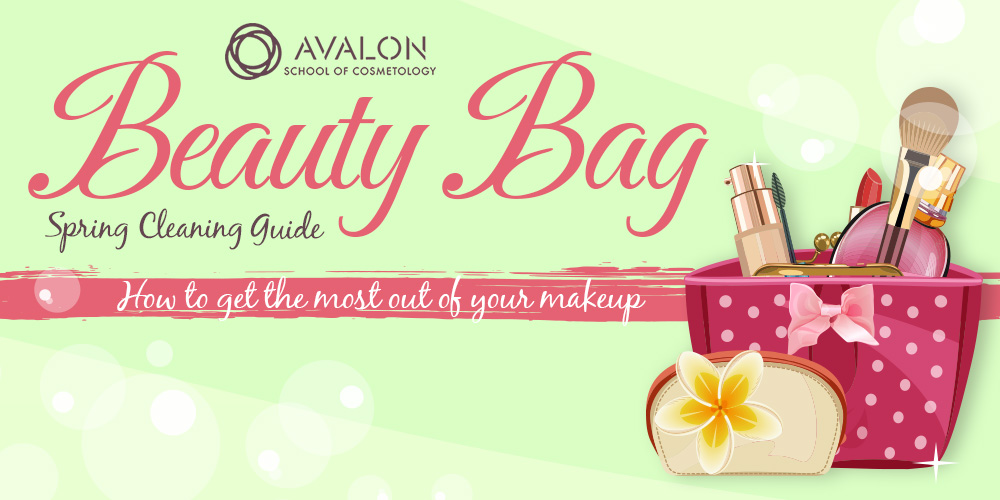
Spring has arrived, and you know what that means! That’s right, it’s time to spring clean, but have you ever thought about spring cleaning your makeup collection?
If not, now is the time! And here’s the reason why, cosmetic products actually do expire.
That means that it’s time to get rid of that bottle of foundation that you’ve had since the summer of 2012 that isn’t quite the right shade, but you keep it around for when you run low.
So how can you tell when your product’s expiration date is? On the bottom of the container or the packaging is a small illustration with numbers and letters in it.
For example, you may see “18M” or “12M” meaning that the product should be used within 18 months or 12 months of being opened. Depending on the product, size of the container, etc… the location of the indicator could vary.
Why Does It Matter?
It won’t make you terribly ill to use makeup that is expired, but it could cause other unpleasant problems. Your face is a pretty sensitive area, so it’s important to take care of it. In the same way that it’s not advised to share items like mascara and eyeliner (due to potential transfer of harmful bacteria) it’s also not advised to use makeup that is expired because of bacteria and chemical breakdown.
The expiration date is really just the window of time in which the manufacturers of the product consider the product safe to use. Much like hair products that sit for prolonged periods of time the chemicals used to make cosmetics also break down which means that the product will not be as effective.
This could mean that the color is distorted from the original shade, or if it is a liquid that the elements separate. Using products that have broken down chemically could also cause skin rashes and potentially even bacterial infections.
Check out the infographic below, and get your makeup bag organized and spring- ready!

Rules of Thumb
Though you should take peek at the expiration date on the cosmetic products that you buy, there are some general standards for common makeup products.
Mascara
This has the smallest window of time before the product expires with the expiration date being 2-3 months from the time that it’s opened. There may be some products that are good for as long as 6 months, but you’ll always want to double check. When it starts getting clumpy, dries out, or separates its time to toss it!
Liquid Foundation, BB & CC Creams, and Tinted Moisturizers
These products traditionally have the shorter shelf lives, with most of the products needing to be used within six to 12 months.
Eyeshadows, Cremes, and Paints
Eye products typically last longer than liquid foundations and other products with a general life of 12-24 months depending on the brand.
Lipstick and Gloss
Surprisingly, lipstick stays good for approximately two years whereas lip gloss products usually expire in only one year. When gloss becomes very sticky or lipstick dries and clumps on your lips, it is probably time to kiss it goodbye.
Liquid Eyeliner, Creme Eyeliner
These products last for a varied amount of time. Mascaras generally expire between 12-18 months, and liquid and creme eyeliner sexpire within 12-24 months of being opened.
Nail Polish
Nail polish also has a shelf life of 12-24 months. Surely you’ve had at least a bottle or two separate or become streaky. When that happens it’s time to toss and replace with new colors.
Eye Pencils, Face Powders
These products typically have the longest shelf lives, with 18-36 months.
For those who wear makeup consistently, it’s likely that you’ll use up most of the product – if not all – long before the expiration date. But for those of us who use less or even a less complex makeup routine, it’s a good idea to take note of when you open a new product.
Pro-Tip: Use a permanent marker to write the day and month that you open something on the bottom of the container.
If you have an inventory that is very large, take a cue from the pros and make an inventory sheet and that notes the date of purchase, open/first use and the expiration date.
We also recommend investing in a brush cleaner to regularly wash product and facial oils from your brushes. This will help to prevent the transfer and build up of bacteria that can cause skin irritation and infections.
Don’t know where to start? Avalon School of Cosmetology can help! Book an appointment in our salon or learn about our cosmetology and esthetics courses and learn all about cosmetic safety!